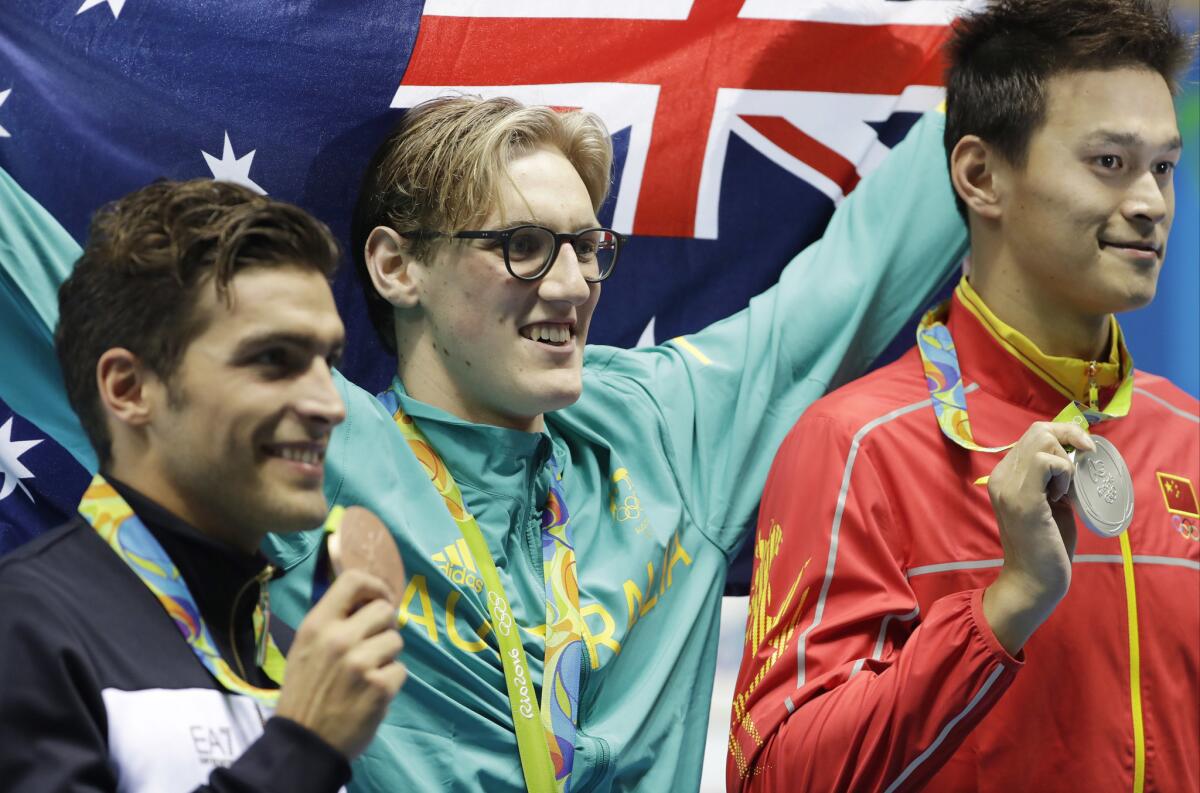China racks up 8 medals, and a list of perceived slights, at Rio Olympics

- Share via
Reporting from Beijing — As of early Monday, China had scored eight medals at the Rio Olympics, leaving the country in second place behind only the United States, which has 12 so far. But the Middle Kingdom has found more to gripe about than celebrate so far.
Chinese fans are furious that Australian swimmer Mack Horton called Chinese rival Sun Yang a “drug cheat” before going on to best him Saturday in the 400-meter men’s freestyle. The two apparently got into a spat last week in the training pool, with Sun reportedly splashing Horton and trying to distract him.
For the record:
12:50 p.m. Aug. 22, 2019The caption on an earlier version of this post said Italy’s medalist won silver and China’s won bronze. Italy took the bronze and China the silver.
China’s anti-doping agency imposed a three-month suspension on Sun in 2014 for taking a banned stimulant. The suspension was served in secret and not revealed until after the fact. Sun has said he took a stimulant, trimetazidine, for angina.
Chinese fans took to the Internet over the weekend to call Horton a racist and demand an apology for his “arrogance” and “slander.”
Horton, who won the gold, has refused to apologize to Sun, who took the silver medal. Horton told the Sydney Morning Herald: “I used the words ‘drug cheat’ because he tested positive. I just have a problem with him testing positive and still competing.”
It’s not a big deal to us. In many serious essays written by Westerners, Australia is mentioned as a country at the fringes of civilization.
— China’s Global Times newspaper
An op-ed in China’s Global Times tabloid, which is closely linked with the Communist Party, said: “We think Australia should feel embarrassed with Horton’s remarks. … We don’t know if it is Horton who is silly or it’s the Australian media that is evil, or perhaps Australia just has a different moral standard. The message sent is abnormal and aberrant.”
“It’s not a big deal to us. In many serious essays written by Westerners, Australia is mentioned as a country at the fringes of civilization,” the op-ed continued. “In some cases, they refer to the country’s early history as Britain’s offshore prison. This suggests that no one should be surprised at uncivilized acts emanating from the country.”
Chinese swimming officials said Horton should apologize. Bai Yansong, a prominent commentator for state-run CCTV, was even more direct, calling Horton a “bastard” and a “jerk” in an online commentary.
That wasn’t the only China-Australia rift to ruffle feathers. The Global Times also complained that Australia’s Channel 7 cut from the Chinese national team’s entry into the stadium during the opening ceremony to show an advertisement for McDonald’s.
The tabloid, though, seemed to have no beef with the fact that China’s own state-run CCTV failed to acknowledge the entrance of the Philippine squad during the opening ceremonies. China and The Philippines have been at loggerheads lately after Manila won a verdict against Beijing at an international tribunal over claims to islets in the South China Sea.
Chinese Internet users applauded the strategic omission.
Meanwhile, Chinese officials have complained that the Chinese flags being used in the Olympic venues are defective.
China’s flag features a red background with one large yellow star in the upper left corner and four smaller yellow stars surrounding it. The points of the smaller stars are supposed to be directed toward the large star; instead, the flags in Rio featured the four small stars arranged in parallel.
China’s consul general in Rio, Song Yang, said via social media that he had contacted the organizing committee and demanded that the mistake be rectified immediately. But the organizing committee said all flags used at the games had received approval from the organizing committees of each respective country.
It was unclear where the flags were manufactured; some reports said they were made in Brazil but others indicated they were manufactured in China.
But not all the commentary about Rio in China was negative. The state-run China Daily praised the opening ceremony for reminding viewers that “money is not everything, and conscience and creativity can go a long way.” The budget for the Rio Olympics has been pegged at 1/12th that of London’s 2012 Summer Games and 1/20th of that of Beijing’s 2008 games.
“With Beijing and London setting a high bar for opening ceremony theatricality, few had anticipated anything this impressive from Rio. After all, opening ceremonies are increasingly costly these days with host countries competing to invest in effects they deem commensurate with the self-image they intend to project,” the paper said.
“Rio … was operating on a comparative shoestring. But the show they presented was nothing short of spectacular.”
Beijing hosted the 2008 Summer Games and will host the 2022 Winter Games.
Follow me on Twitter @JulieMakLAT.
ALSO
Brazilians slowly warming to Olympic fever
2016 Summer Olympics live coverage: Day 3 of competition is underway
More to Read
Sign up for Essential California
The most important California stories and recommendations in your inbox every morning.
You may occasionally receive promotional content from the Los Angeles Times.











